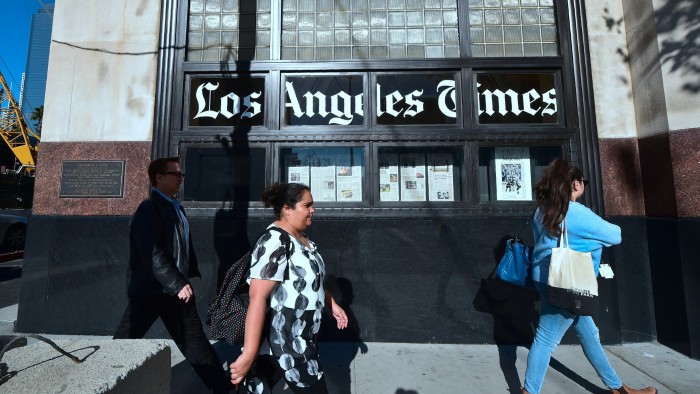Stay informed with free updates
Simply sign up to the Media myFT Digest — delivered directly to your inbox.
Efforts by tech billionaires Patrick Soon-Shiong and Jeff Bezos to overhaul two of America’s most storied newspapers in an effort to “restore trust” in the news media are raising alarm among press advocates.
Soon-Shiong, a biotech entrepreneur who bought the Los Angeles Times in 2018, said this week he had been “quietly building” an artificial intelligence-powered “bias meter” to attach to the newspaper’s stories.
“So somebody could understand as they read it that the source of the article has some level of bias . . . And then, automatically, the reader can press a button and get both sides of that exact same story . . . and then give comments”, said Soon-Shiong in an appearance on political commentator Scott Jennings’ radio show.
“I knew that I had to address even the newsroom by saying look, are you sure your news is news? Or is your news really [your] opinion of your news?” he said.
The comments were criticised by press advocates and journalists.
“He’s declaring himself to the public as in opposition to his own staff . . . You’ve declared your lack of trust in them and that you’re going to be independently monitoring and grading them in a public venue”, said Ann Marie Lipinski, curator of Harvard’s Nieman Foundation for Journalism.
“I just think that is so unhealthy for what is already a fragile industry.”
Vivian Schiller, the former chief executive of NPR, described the plans as “everybody’s worst nightmare about a billionaire owner”.
US newspapers have been in financial flux for decades after the advent of the internet ripped apart the print advertising model that had sustained the industry.
Billionaires have emerged as “white knight” acquirers for large regional US newspapers that were cash-strapped but still wielded influence.
“That was thought of like: hey, this is great . . . They will sit back, run the business and we will do the journalism. Of course we’re now seeing the limits of that”, said Gabriel Kahn, a journalism professor at the University of Southern California.
Amazon founder Jeff Bezos acquired The Washington Post in 2013 and was previously credited with turning around the paper’s fortunes. But the Post has lost momentum, bleeding a large chunk of its audience and tens of millions of dollars a year.
Bezos told a conference on Wednesday that he “had a bunch of ideas” to restore the paper.
“I’m working on that right now. And I have a couple of small inventions there”, he said. “We’re struggling with the issue that all traditional media is struggling with, which is a very difficult and significant loss of trust”.
Soon-Shiong and Bezos both sparked outrage in their newsrooms when they pulled their papers’ endorsements of presidential candidate Kamala Harris just a few weeks before the US election.
Bezos said on Wednesday: “I’m proud of the decision we made, and it was far from cowardly”. He also said he was “very hopeful” about Donald Trump’s return to the White House.
Soon-Shiong told Jennings on Wednesday: “I knew I was going to take heat, I knew it was going to be painful. I knew that people don’t like change.”
Soon-Shiong recently appointed Jennings, who previously worked in the George W Bush administration, to the LA Times’s editorial board to “create some level of balance”.
A spokesperson for the Los Angeles Times did not respond to requests for comment.
Trust in the US news media is at historic lows. Less than a third of Americans in 2024 said they had a “great deal” or “fair amount” of trust in the media to report the news fairly and accurately, down from about 70 per cent in the 1970s, according to Gallup polls.
Read the full article here

